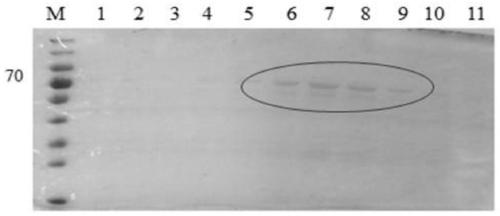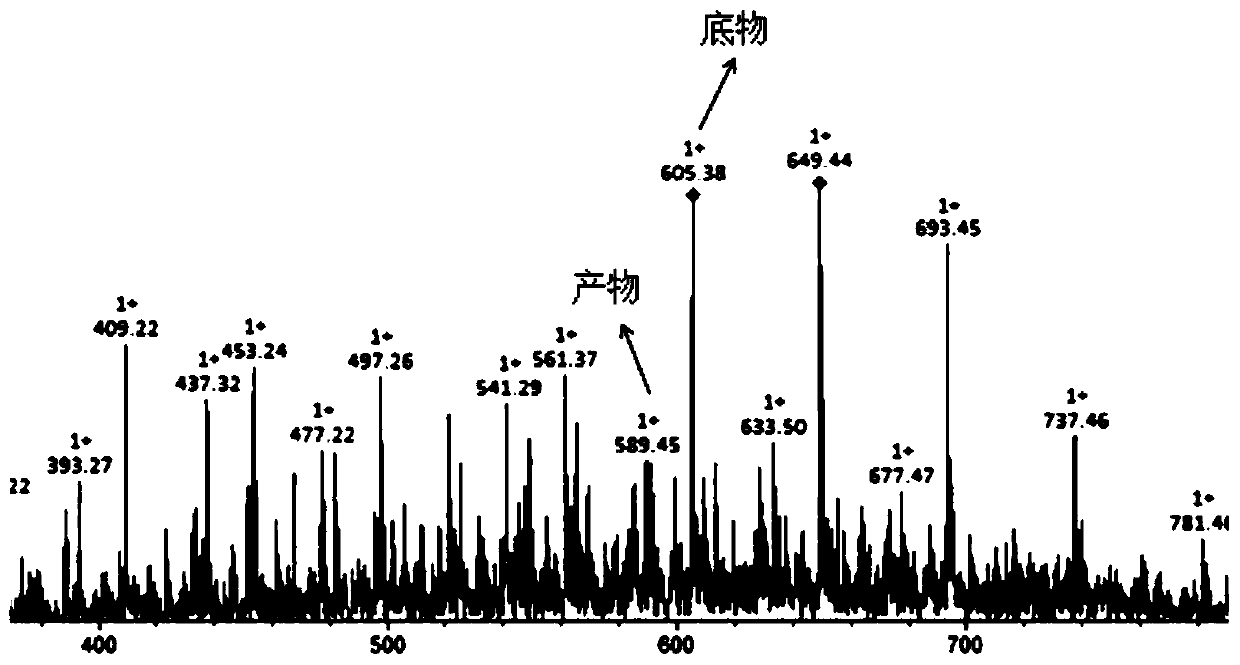The gene encoding GDP-mannose-4,6-dehydratase in kelp, its protein and its application
A mannose and protein technology, applied in genetic engineering, plant genetic improvement, enzymes, etc., to achieve the effect of excellent genetic resources and enzyme resources
- Summary
- Abstract
- Description
- Claims
- Application Information
AI Technical Summary
Problems solved by technology
Method used
Image
Examples
Embodiment 1
[0026] The acquisition of SjaGM46D1 gene in the sea-tangle of embodiment 1
[0027] The kelp was collected from Rongcheng City, Shandong Province, and the total RNA of the female gametophyte of kelp was extracted by Trizol method, and PrimeScript II 1 from TAKARA Company was used st The Strand cDNA Synthesis kit was used to reverse transcribe the total RNA of Laminaria gametophytes to obtain the first-strand cDNA. Using the cDNA as a template, the CDS full-length sequence of the Laminaria SjaGM46D1 gene was amplified, and EcoRI and SalI restriction sites were introduced at both ends (the amplification primers were 5'-GAATTCATGGCTGAGCCGGAGACG-3' and 5'-GTCGACTTAGGCGTGCTCGTTGCC-3' ). The PCR amplification program was: 94°C for 3min; 30 cycles of 94°C for 30s, 59°C for 30s, 72°C for 2min; 72°C for 10min. After the PCR products were detected by 1% agarose gel electrophoresis, the gel blocks containing the target bands were cut under ultraviolet light, and the target fragments w...
Embodiment 2
[0028] Cloning expression of embodiment 2 SjaGM46D1 gene
[0029] The SjaGM46D1 gene fragment obtained in Example 1 was connected between the EcoRI and SalI sites of the pGEX-6p-1 vector (purchased from GE Healthcare) to obtain the pGEX-SjaGM46D1 recombinant vector; the obtained pGEX-SjaGM46D1 recombinant vector was transformed into large intestine Bacillus E.coli BL21 (DE3) competent cells (purchased from Takara Company), spread on LB solid culture plates containing 100 μg / mL ampicillin, and cultivate overnight at 37°C; In ampicillin-based LB liquid medium, cultivate at 37°C until the OD600 of the bacterial liquid is 0.4, add a final concentration of 0.1mMIPTG, and induce the expression of the target protein for 16h under the induction conditions of 16°C and 160rpm.
Embodiment 3
[0030] The separation and purification of embodiment 3 SjaGM46D1 protein
[0031] Collect the bacterial cells obtained by inducing expression in Example 2, resuspend each liter of bacterial liquid with 50ml PBS, add 1% Triton X-100, 1% β-mercaptoethanol; ultrasonically break the bacterial cells on ice, centrifuge at 12000rpm for 10min Take the supernatant, add an appropriate amount of GST-beads to the supernatant, shake gently to make it adsorb protein for 1h; centrifuge at 5000rpm for 3min and discard the supernatant; add at least 10 times the volume of PBS, shake gently until the beads are suspended in the solution, 5000rpm for 3min Discard the supernatant by centrifugation and repeat this step twice; add 1mL GST Elution Buffer and shake gently for 10min; centrifuge at 5000rpm for 3min to collect the supernatant; repeat the first two steps twice to obtain the purified protein, which is encoded by the SjaGM46D1 gene The protein whose amino acid sequence is shown in SEQ ID NO:...
PUM
| Property | Measurement | Unit |
|---|---|---|
| molecular weight | aaaaa | aaaaa |
Abstract
Description
Claims
Application Information
 Login to View More
Login to View More - R&D
- Intellectual Property
- Life Sciences
- Materials
- Tech Scout
- Unparalleled Data Quality
- Higher Quality Content
- 60% Fewer Hallucinations
Browse by: Latest US Patents, China's latest patents, Technical Efficacy Thesaurus, Application Domain, Technology Topic, Popular Technical Reports.
© 2025 PatSnap. All rights reserved.Legal|Privacy policy|Modern Slavery Act Transparency Statement|Sitemap|About US| Contact US: help@patsnap.com


